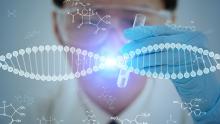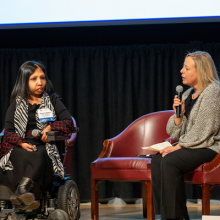News
Explore the latest stories and publications from NCATS and our partners, see upcoming events, or explore the variety of resources we provide to better understand translational science and our work.
News
Read the latest news from NCATS and its collaborators whose research is supported through the Center’s programs, or follow coverage of NCATS' translational research activities through national and local media.

NCATS Researchers Help Gene Therapy for AADC Deficiency Gain FDA Approval
December 13, 2024 - NCATS News
- Therapeutics for Rare and Neglected Diseases (TRND)
NCATS’ Therapeutics for Rare and Neglected Diseases (TRND) program helped develop a recently approved gene therapy for a rare genetic brain disorder.
Read Article
Paving the Way for Ultrarare Bone Disease Treatment Trial
May 21, 2024 - NCATS News
- Our Impact on Drug Discovery and Development
- Therapeutics for Rare and Neglected Diseases (TRND)
Clinicians at the NIH Clinical Center will soon start testing an investigative drug for an ultrarare bone disease.
Read ArticleSugar Molecule Could Resolve Rare Diseases
February 28, 2023 - Grantee/Partner News
- Therapeutics for Rare and Neglected Diseases (TRND)
JAMA Neurology Publishes Positive Pivotal Clinical Trial with Vamorolone in Duchenne Muscular Dystrophy
September 1, 2022 - Media Coverage
- Therapeutics for Rare and Neglected Diseases (TRND)
Rare Disease Day 2022 – A Day to Embrace Innovation (and Wear Your Stripes)
February 26, 2022 - Media Coverage
- Genetic and Rare Diseases (GARD) Information Center
- Rare Diseases Clinical Research Network (RDCRN)
- Therapeutics for Rare and Neglected Diseases (TRND)
Know All About Rare Disease, Causes And Characteristics
February 26, 2021 - Media Coverage
- Genetic and Rare Diseases (GARD) Information Center
- Rare Diseases Clinical Research Network (RDCRN)
- Therapeutics for Rare and Neglected Diseases (TRND)
NCATS, NRL Create Nanoparticle SARS-CoV-2 Model to Speed Drug Discovery for COVID-19
September 18, 2020 - NCATS News
- Therapeutics for Rare and Neglected Diseases (TRND)
A team of scientists from NCATS and the Naval Research Laboratory (NRL) in Washington, D.C., developed a new tool that mimics how SARS-CoV-2 — the virus that causes COVID-19 — infects a cell, infor
Gene Therapy for Rare, Pediatric Condition Moves Closer to Reaching U.S. Patients
September 6, 2017 - NCATS News
- Therapeutics for Rare and Neglected Diseases (TRND)
Researchers from NCATS’ Therapeutics for Rare and Neglected Diseases program and Agilis Biotherapeutics, Inc., collaborated to bring a gene therapy for the rare pediatric condition aromatic L-amino


